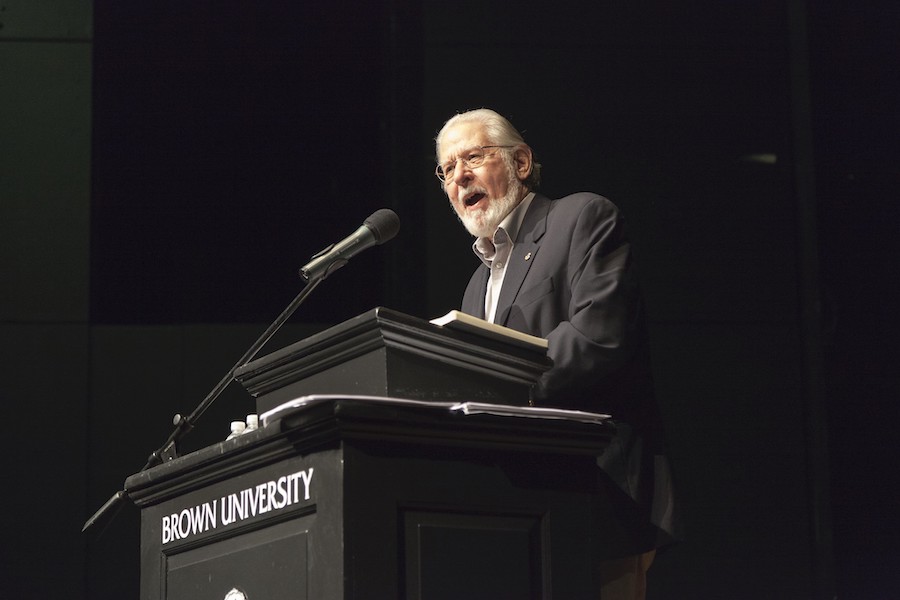Don Wilmeth and I have been so closely linked over the years that I have to make an effort to remember when we first met. We probably became acquainted as members of ASTR some time in the mid-1970s, and since we both had long tenures at universities only an hour away from one another, the opportunities for gatherings were many.
Don was my benefactor in many ways. While working on his bibliography of popular entertainment, he asked if I knew of one devoted exclusively to British music hall. This inspired me to fill the gap by undertaking to compile the first. He also sponsored a performance at Brown of my translation of Chekhov’s The Cherry Orchard, directed by John Emigh. This was the beginning of a series of invitations to come to Providence and speak, the very last time for the lecture series he had founded. He put me on the advisory board of the American theatre history series he was editing for Cambridge University Press and recruited me as a contributor to The Cambridge Guide to American Theatre. He was also one of those who recommended me for the College of Fellows of the American Theatre.
Such generosity was characteristic, especially to the profession at large. He was a mover and shaker in ASTR, serving as its president and on its executive board for many years. When in 1992 an annual conference in Cambridge fell through at the last minute, he showed great ingenuity and organization skill in moving it successfully to Newport. His wife, Judy, served as unpaid secretary for many years, recording the minutes of meetings. The two of them were among the first in our field to master the laptop, and I can recall many meetings accompanied by the “ping” from Don’s Macintosh.
If it had an acronym, Don was a member: UCTA, TLA, IFTR, ATA, ATHE, ATDS, ANTA, NETC. Don was indefatigable in undertaking projects: encyclopedias, book series, special issues, exhibitions, and benefit performances, as well as editing periodicals or their book review sections. For many years, he served as a judge for book award competitions and rarely refused to sit on doctoral dissertation defenses. When I went on sabbatical, I convinced him to teach a graduate seminar at Tufts on Bernard Shaw, one of his specialties.
Although Don’s first important monograph was on the British tragedian Cooke, his real field was the history of American theatre. In depth and breadth of knowledge, awareness of sources, openness to such phenomena as circus, tent shows, and the Wild West, he was without peer. Many of the most durable biographies, reference books, and monographs on these subjects are of his devising. No wonder he was often sought after by documentary makers to be an articulate talking head.
He also was one of a group of American theatre scholars invited to Moscow in 1989, as glasnost made itself felt. Unfortunately, he traveled on a different flight from the rest of us. His bags were lost and every morning he had to be driven out to Sheremetovo airport to see if they had turned up. In the meantime we outfitted him from our wardrobes and toilet kits.
Don was a jovial and boisterous companion, replete with anecdotes and theatre gossip, delivered in a booming basso that could reach to the farthest ends of an auditorium. Since we were both avid collectors of theatricalia, we would meet at book and ephemera fairs, occasionally competing for the same item. He, however, limited himself to Anglo-American material, with a special interest in Charles Mathews and caricature. He also was an assiduous promoter of Brown’s magic collection and tried never to miss a performance of Ricky Jay.
When I first joined ASTR back in the early 1970s, the field of theatre history seemed to be populated by giants: Kalman Burnim, Harry Pedicord, Oscar Brockett, Brooks McNamara, William Appleton among them. Don soon joined that pantheon, and I like to think of him gathered with them around some Olympian bar, arguing the finer points of theatre past.
Laurence Senelick, Fletcher Professor of Oratory Emeritus at Tufts University, is the author of more than 25 books on theatre and performance.


